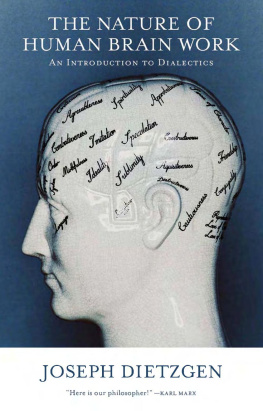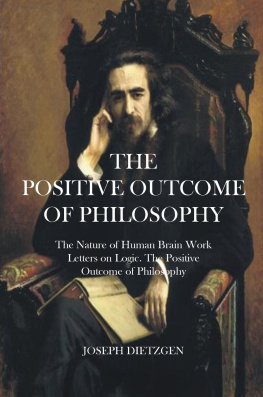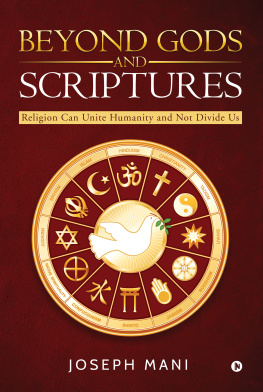Joseph Dietzgen - The Religion of Social-Democracy
Here you can read online Joseph Dietzgen - The Religion of Social-Democracy full text of the book (entire story) in english for free. Download pdf and epub, get meaning, cover and reviews about this ebook. year: 2016, genre: Religion. Description of the work, (preface) as well as reviews are available. Best literature library LitArk.com created for fans of good reading and offers a wide selection of genres:
Romance novel
Science fiction
Adventure
Detective
Science
History
Home and family
Prose
Art
Politics
Computer
Non-fiction
Religion
Business
Children
Humor
Choose a favorite category and find really read worthwhile books. Enjoy immersion in the world of imagination, feel the emotions of the characters or learn something new for yourself, make an fascinating discovery.

- Book:The Religion of Social-Democracy
- Author:
- Genre:
- Year:2016
- Rating:4 / 5
- Favourites:Add to favourites
- Your mark:
- 80
- 1
- 2
- 3
- 4
- 5
The Religion of Social-Democracy: summary, description and annotation
We offer to read an annotation, description, summary or preface (depends on what the author of the book "The Religion of Social-Democracy" wrote himself). If you haven't found the necessary information about the book — write in the comments, we will try to find it.
The Religion of Social-Democracy — read online for free the complete book (whole text) full work
Below is the text of the book, divided by pages. System saving the place of the last page read, allows you to conveniently read the book "The Religion of Social-Democracy" online for free, without having to search again every time where you left off. Put a bookmark, and you can go to the page where you finished reading at any time.
Font size:
Interval:
Bookmark:

First published: in Volksstaat during the years 1870-1875;
Joseph Dietzgen, Philosophical Essays, Charles H. Kerr & Company, Chicago, 1906, pp. 90-154, edited by Eugene Dietzgen & Joseph Dietzgen Jr.
Translated: by M. Beer & Th. Rothstein.
Transcribed: by Einde OCallaghan for the Marxists Internet Archive.
Joseph Dietzgen 1870-75
The Religion of Social-Democracy
Six Sermons
(1870 to 1875)
Friends and Fellow-Citizens: The teachings of Social ism contain the material for a new religion which, unlike any other religion, appeals not merely to the heart and emotions, but at the same time to the brain, the organ of knowledge. From all other earthly knowledge socialism is distinguished by its religious form, by its fervid appeal to the heart and soul of man. Generally speaking the object of religion is to save the suffering soul from the gloom and misery of earthly life. This object it has thus far realized only in an unreal and fantastic manner, by referring us to an invisible God and to a Kingdom inhabited by ghosts. The gospel of to-day promises to save us from misery in a real and palpable way. God, that is the Good, the Beautiful and the Holy, is to be made man, and is to descend from heaven unto the earth, not as in the days of old in the flame of religion and in the spell of wonder, but in reason and reality. We want our saviour, our Word, to become flesh, and to be materialized not in one individual only. All of us desire, the people want to become sons of God.
Religion was until now a matter for the dispossessed. Now, however, the matter of the dispossessed is becoming religion, that is something which takes hold of the whole heart and soul of those who believe. The new faith, the faith of the proletariat, revolutionizes every thing, and transforms after the manner of science, the old faiths. In opposition to the olden times we say, Sun, stand thou still, and Earth, move and transform! In the old religion man served the gospel, in the new religion the gospel is to serve man. In order to emancipate humanity from religion not only vaguely but distinctly and really, it is necessary to overcome religion by analyzing and fully comprehending it. The new gospel asks for a thorough revision of the whole system of our thought. According to the old revelation the law was the primary, the supreme and the eternal, and man the secondary element.
According to the new revelation man is the primary, the supreme and the eternal, and the law the secondary, temporary and transitory element.
We do not live for the sake of the law, but, on the contrary, the law exists for our sake, to serve us, and to be modified according to our needs. The old gospel required of us patience and submissiveness ; the new gospel requires of us energy and activity. In the place of grace it puts conscious work. The old bible was named authority and faith; the new has for its title revolutionary science.
Faith and science, my dear friends, form the contradiction which separates the old from the new gospel. Those who have clearly grasped this distinction are incipient socialists, even if they have not penetrated to the political or social consequences springing from it. This distinction between faith and science contains the germ of revolutionary development. Both pursue the same end, the salvation of mankind, yet their ways are as poles asunder. Faith refers us to fancy and imagination, science to reason and reality.
Our opponents, the scribes and pharisees of the old gospel, stand and fall with the dogmas of their faith; they are past redemption. Those, however, who stand on the ground of science, submit their judgment to the crucible of facts ; they are the followers of the new gospel. The struggle between faith and science, the antagonism between the old and the new gospel, dates by no means from the days of socialism. It goes back to the ancient world, to the beginnings of scientific research, then it revives with the renaissance and grows more and more with the approach of the present era where it finds its embodiment in our leaders of scientific thought, though it reaches its full development only in the modern labor movement.
All great movements of the past were but the fore runners, the preliminaries of the general movement, of the coming great revolution whose birth we are witnessing. Greek civilization and Christianity, the Reformation, the French revolution of 1789, philosophy and modern science are mere instruments, but industry is the great architect, and socialism the lofty structure which the nations of our time are rearing. The history of the past has diligently collected the necessary materials, and now, friends, the time has come to dig up the soil and to lay the foundations.
Valuable as the labors of the past may be, they are but fanciful ornaments in comparison with the fundamental work the future has to carry out.
Man is free, even were he born in chains. This saying of Schiller needs correction. For man is born in chains and must struggle for freedom. The heaviest chains, the strongest fetters were put on him by Nature. Against her tyranny he struggles from the beginning of his days. Sustenance and apparel he must wrest from her. The whip of dire necessity in her hand she stands over him, and on her whims and frowns his existence depends. It was the tyranny of Nature which gave religion that predominant influence over the soul of man. Religion promised him relief from the heavy hand of Nature. How long and anxiously did Judaism wait for the Kingdom of the Messiah! Consider the ravens: for they neither sow nor reap ; which neither have storehouse nor barn ; and God feedeth them ; how much are ye better than the fowls? Praying and fasting are the means recommended by Christianity against the inborn helplessness of man. Through the whole of the middle ages that advice was faithfully acted upon, until its futility became manifest. With the appearance of Luther religious thought changes. He proclaimed that Christ had performed for us in heavenly grace our religious salvation, thus relegating sacred exercises to Sundays chiefly and giving free the week-days for sober work. His challenge to the medieval Church heralds the era of industrial activity. Even though his followers afterwards misrepresented his teachings and though Luther himself left his work but half finished, it is nevertheless true that with the Reformation man starts out on a new earthly practice, the salvation through Labor without exactly giving up his theories about heaven. He works, accumulates wealth, and with the accumulated wealth he rises to the height of a new conception, to the gospel of social salvation.
Religion has since time immemorial been so much cared for and hallowed, that even those minds who have given up the belief in a personal God, in a supreme protector of mankind, still adhere to some sort of religion. Let us for the sake of those conservatives use the old word for the new thing. This is not only a concession made to prejudice in order the more easily to overcome it, but is also justified by the thing itself. Indeed, religions differ not more nor less from each other than all of them from the anti-religious social-democracy. All religions have this in common, that they strive for the salvation of suffering humanity, and to lead it up to the good, the beautiful, the righteous and the divine. Well, social-democracy is all the more the true religion as it strives for the very same end, not in a fantastic way, not by praying and fasting, wishing and sighing, but in a manner positive and active, real and true, by the social organization of manual and mental work.
Work is the name of the new Redeemer.
Font size:
Interval:
Bookmark:
Similar books «The Religion of Social-Democracy»
Look at similar books to The Religion of Social-Democracy. We have selected literature similar in name and meaning in the hope of providing readers with more options to find new, interesting, not yet read works.
Discussion, reviews of the book The Religion of Social-Democracy and just readers' own opinions. Leave your comments, write what you think about the work, its meaning or the main characters. Specify what exactly you liked and what you didn't like, and why you think so.



